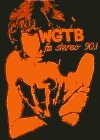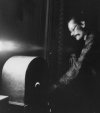
Washington
City Paper
Cover Story:
Radio Free
Georgetown
by Guy Raz
January 29
February 4
1999

|
|
RADIO FREE GEORGETOWN
Big trouble between the station and the university began to brew slightly over a year after Sleeman's arrival. Georgetown University's Brahmins may have been tuning in to frequencies elsewhere, but Nixon's Washington was not. In the spring of 1973, Sleeman received the first of six complaints from the FCC about the station's content.
Democratic West Virginia Congressman Harley Staggers, while driving in his car one day, caught an earful of John Lennon's anthem "Working Class Hero": "Keep you doped with religion and sex and TV/And you think you're so clever and classless and free/ But you're still fucking peasants as far as I can see/A working class hero is something to be."
Staggers sent an angry letter to the FCC, demanding action. Sleeman, under threat of a $10,000 fine and a year in prison, replied: "The people of Washington are sophisticated enough to accept the occasional four-letter word in context and not become sexually aroused, offended, or upset."
The station, for the time being, was off the hook. But now, having the Feds on his back worried Sleeman. It was only the beginning of what would become a series of official and unofficial complaints, and Sleeman knew that Georgetown would no longer act as an oblivious patron.
Sleeman realized his dream of wide-reaching community-based radio early in 1974, when he managed to hire out space on American University's radio tower and increase WGTB's power output to 6,000 watts. Overnight, the station went from having a small but loyal following in the District ("The joke used to be that the coverage pattern was designed to reach ZIP code 20009—Adams Morgan," says Cullen) to a massive one, with coverage reaching parts of Delaware, Pennsylvania, and West Virginia. And just as the audience grew—at its height, WGTB is estimated to have had more than 100,000 listeners—so did the complaints. "It was a fucking trip," recalls Kurcias. "We had a 50-mile radius!"
WGTB received thousands of supportive letters, and Georgetown University received a flood of complaints. "These kinds of people are the last ones we want working for a progressive music station," wrote one alumnus to Father Henle in 1974. Another letter to the FCC griped, "They played a dirty song. It contained words like shit, ass, son-of-a-bitch and fuck....My wife and family were offended and I can't imagine why Father Henle allows such nincompoops to play such filth over a Church-financed radio station....This programming is definitely anti-Christian."
Sleeman, though, was unrelenting. He encouraged station staffers to test the limits of taboo-worthy material. There was a segment of society, Sleeman believed, whose particular cultural consciousness WGTB was serving. No other station in the District was broadcasting the music of Frank Zappa and the social satire of Firesign Theater. Only WHFS came close—but even so, it still aired commercials for U.S. military recruitment during the Vietnam War.
Before university officials cracked the whip, Sleeman had one final showdown with the FCC. In the summer of 1974, the FCC had received a complaint about WGTB's broadcast of the Zappa song "Billy the Mountain." The political allegory follows a man who is dragged through a sensationalist investigation into his subversive activities. Toward the end of the song, Billy finds himself on the run. He enters a phone booth to make a call after purchasing maple syrup and foil-covered wings for human flight:
And then he shut the fucking door! And he pulled down his blue denim policeman-type trouser pants, and he spread even amounts of Aunt Jemima maple syrup all over the inside of his legs! Soon the booth was filling with flies....He held open the legs of his boxer shorts so they could all get in, and when each and every one of those cocksucking flies had gone into his pants and they were lapping up all that maple syrup...
In context, Sleeman saw the broadcast as a legitimate form of art. Georgetown University did not. It tried to strangle the station by slashing funds—to the point where the station was operating on less than $12,000 a year. The budget cut simply prompted the station to solicit funds from listeners. WGTB sponsored open-air concerts on campus and promoted benefit gigs. The pledge drive, in the days before such events became a common fixture of public radio, was so successful that WETA-FM solicited advice from WGTB on how to run its own fundraiser.
"I have received many complaints about the programming and the operation of WGTB-FM," Henle wrote to Sleeman in the summer of 1975. "It is important that the station project an image of Georgetown University that is consonant with its basic principles. To promote, for example, centers of Gay Liberation is not consonant with the purpose of a Catholic university."
Henle was also concerned about the station's reluctance to broadcast Hoya basketball games. The staff believed that basketball was both sexist and gladiatorial. Two years after John Thompson arrived at Georgetown to head the school's basketball team, the Hoyas were far from achieving national glory. The team's performance was so lackluster that the university couldn't persuade commercial stations to air the games. (Today, those same stations would put up millions for the rights to such broadcasts.)
Sleeman, under increasing pressure, capitulated to Henle's demands to air Hoya basketball. On the night of the first broadcast game, the station produced its own introduction. It opened with cheering crowds and heart-pumping beats, then: "Tonight, Georgetown University has forced WGTB to bring you Hoya basketball." At halftime, the station featured a thematic call-in show. The topic was sexism in sports.
Henle, in response to the station's polemic, informed Sleeman of his intention to create a new review panel "with full authority to monitor its programming and personnel." The six-member panel would be headed by Parish.
"They had programs that were quite liberal," Parish recalls. "They were really in the mode of trying to push the envelope....By the time I started paying attention, it was out of control."
Parish got a frosty, if not outright hostile, reception at the station. WGTB staffers viewed her as the personification of the Establishment. "I agreed with the university's stance—the license belonged to [the administration]!" she says today.
Under orders from the university administration, Parish began to outline a series of rules for the station: Remove music with objectionable lyrics, tone down left-wing and pro-gay rhetoric. Sleeman, however, had his own objections. By this time, he had come to believe intensely in the democratization of radio—that the airwaves, no matter who owns the license, belong to the public. The dispute, thereafter, turned largely philosophical.
|